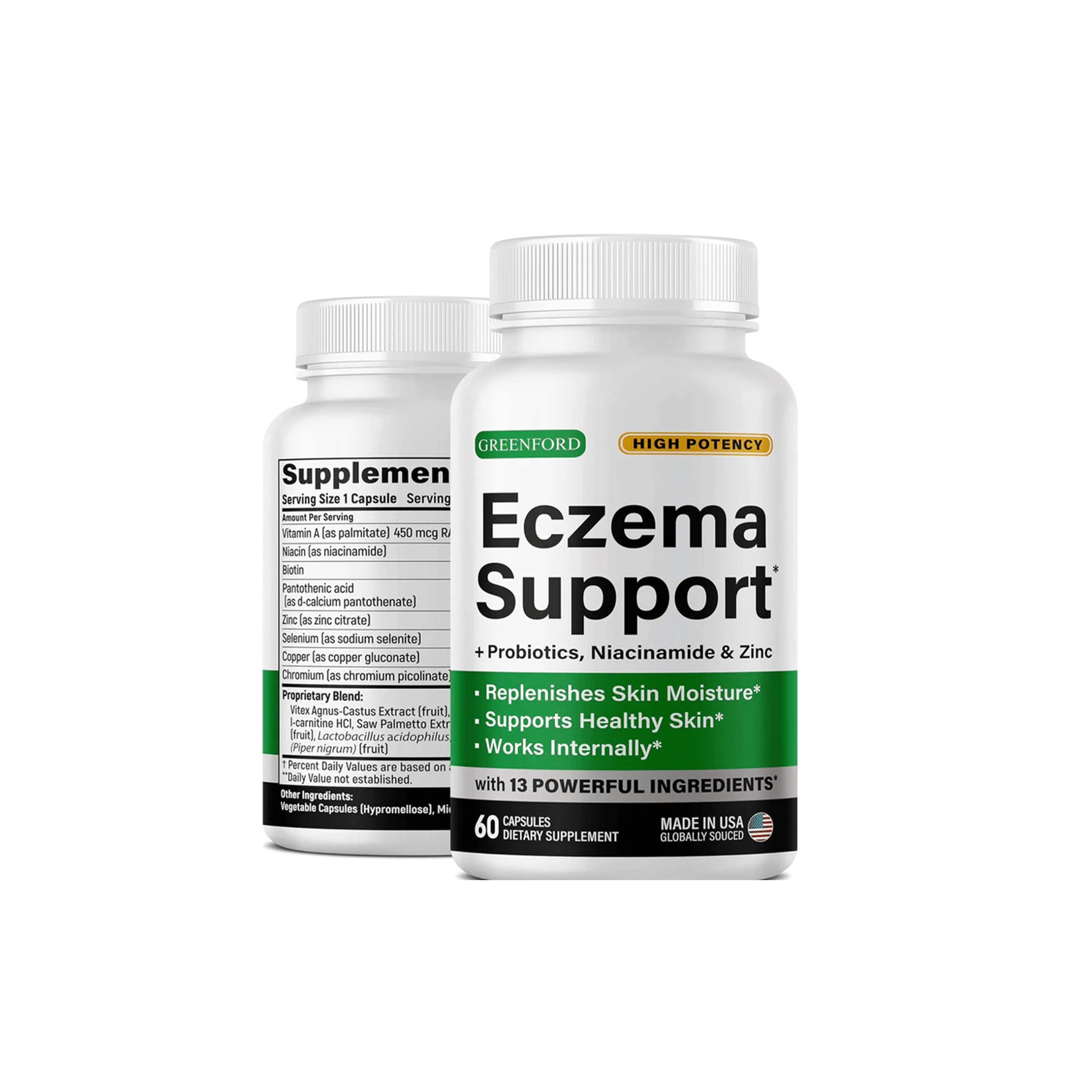
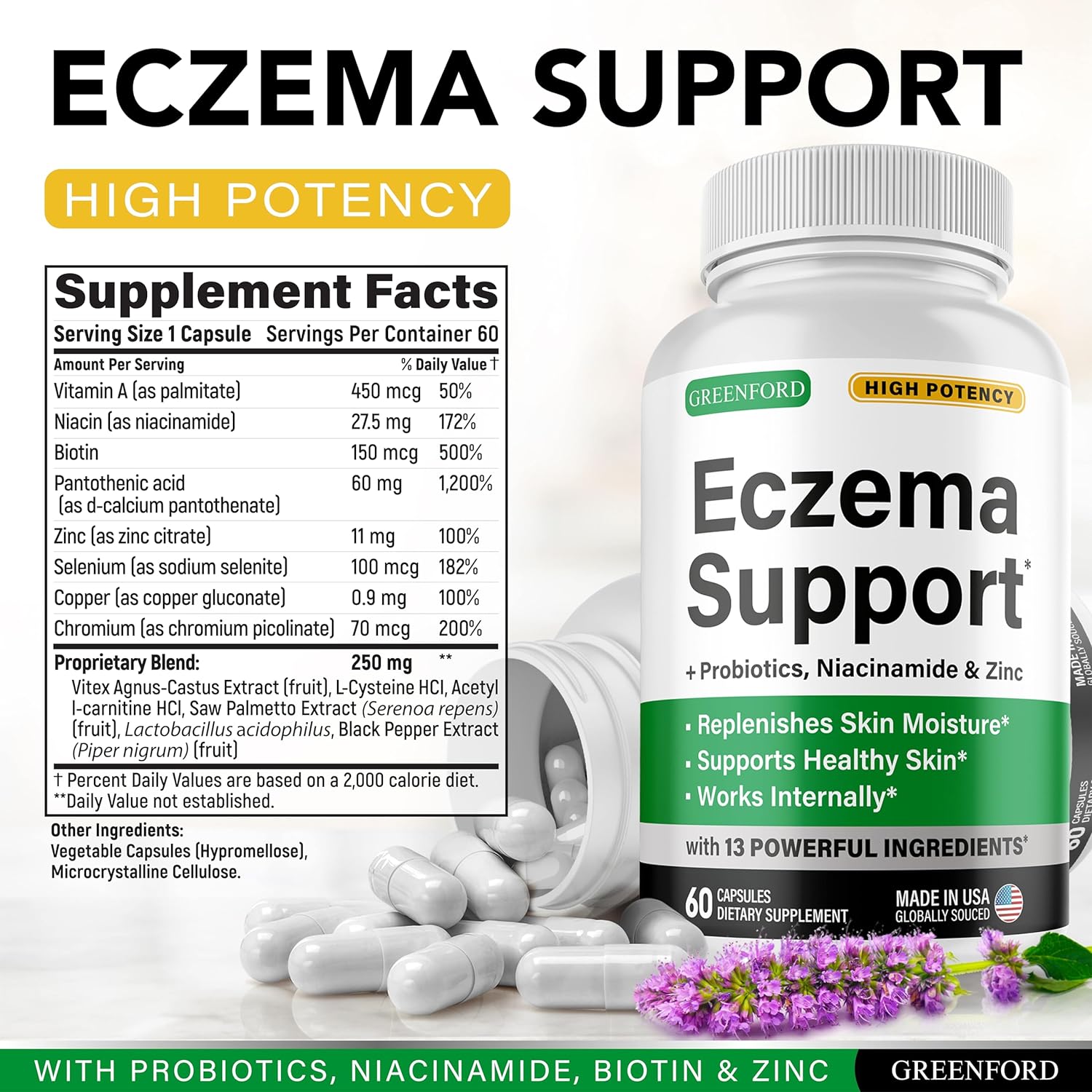
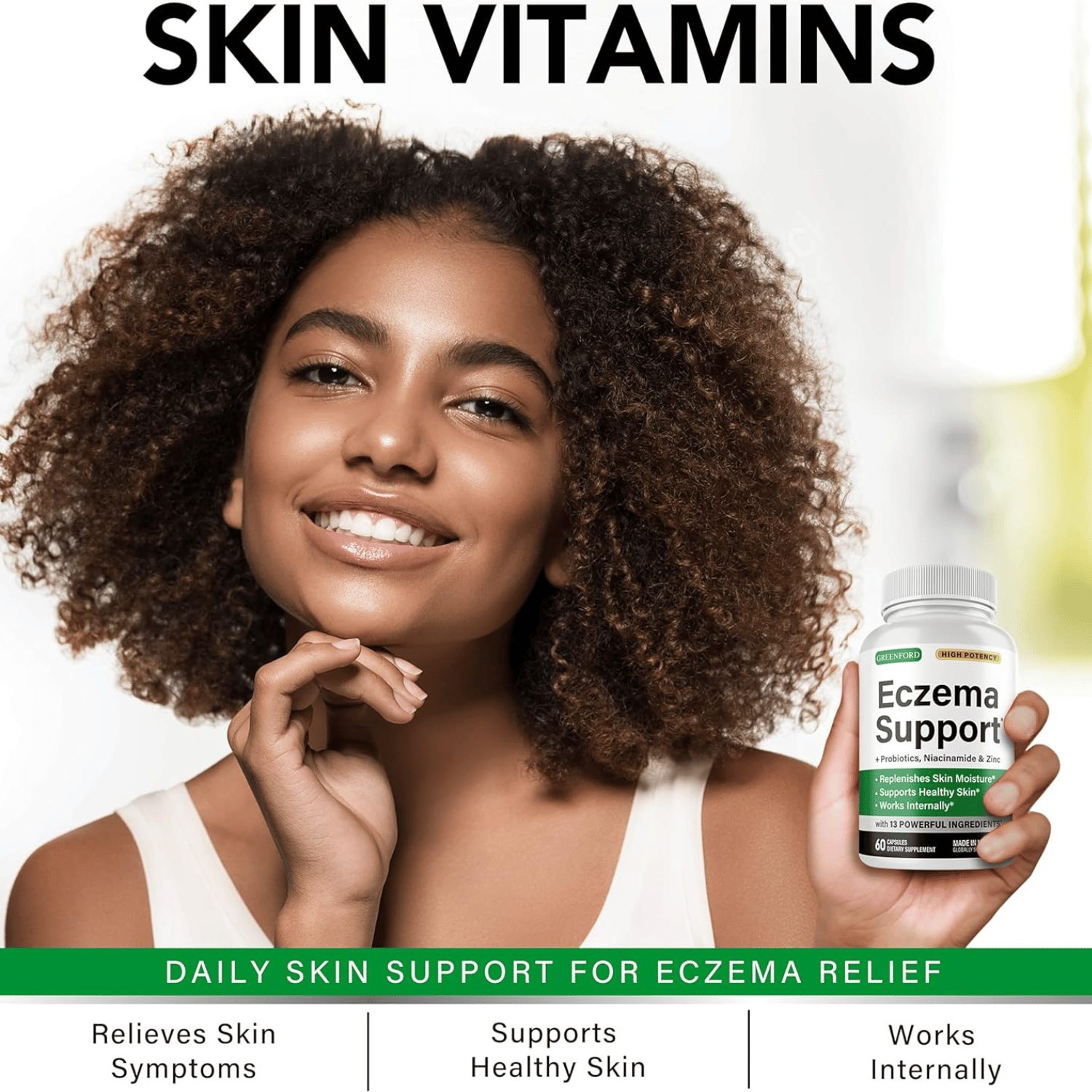
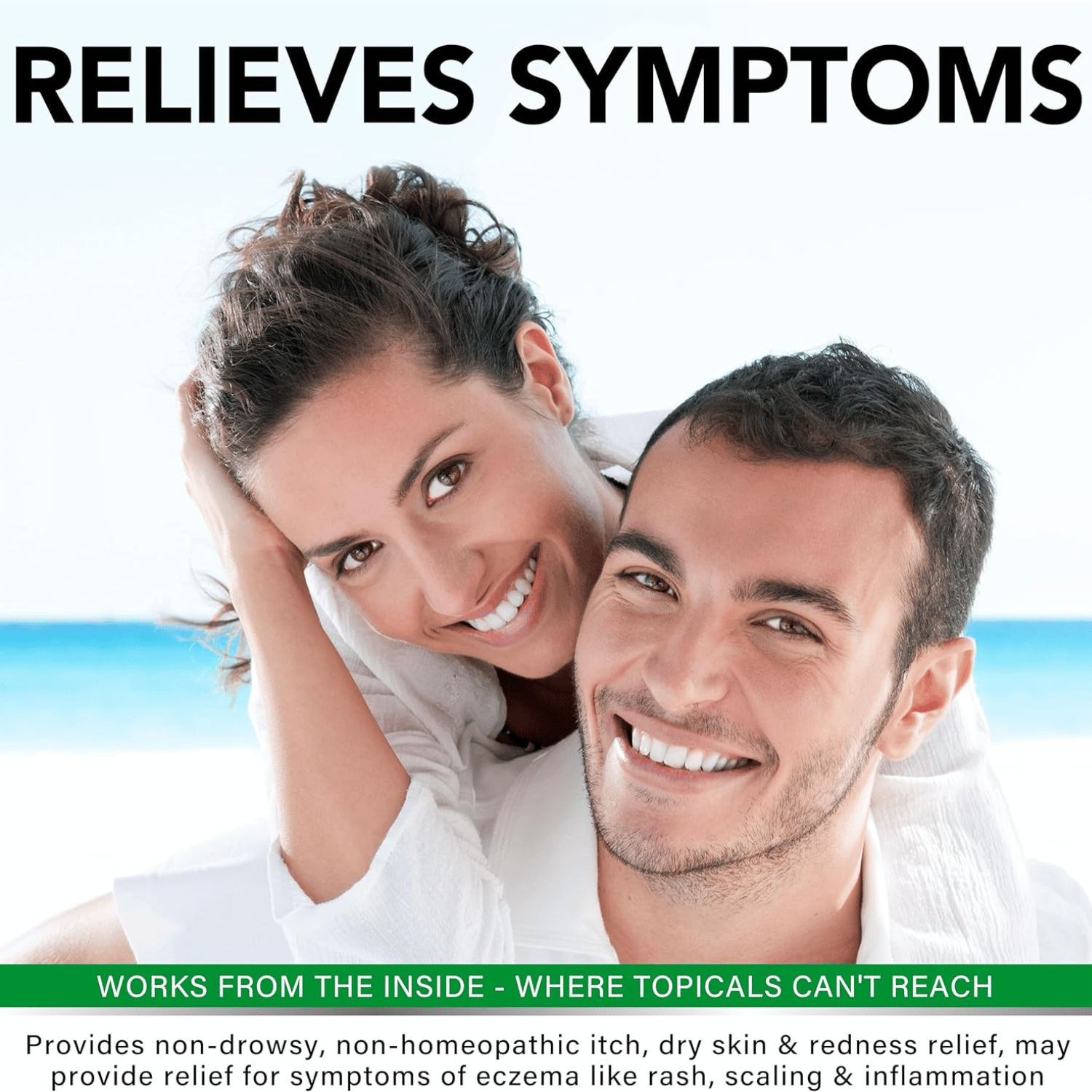
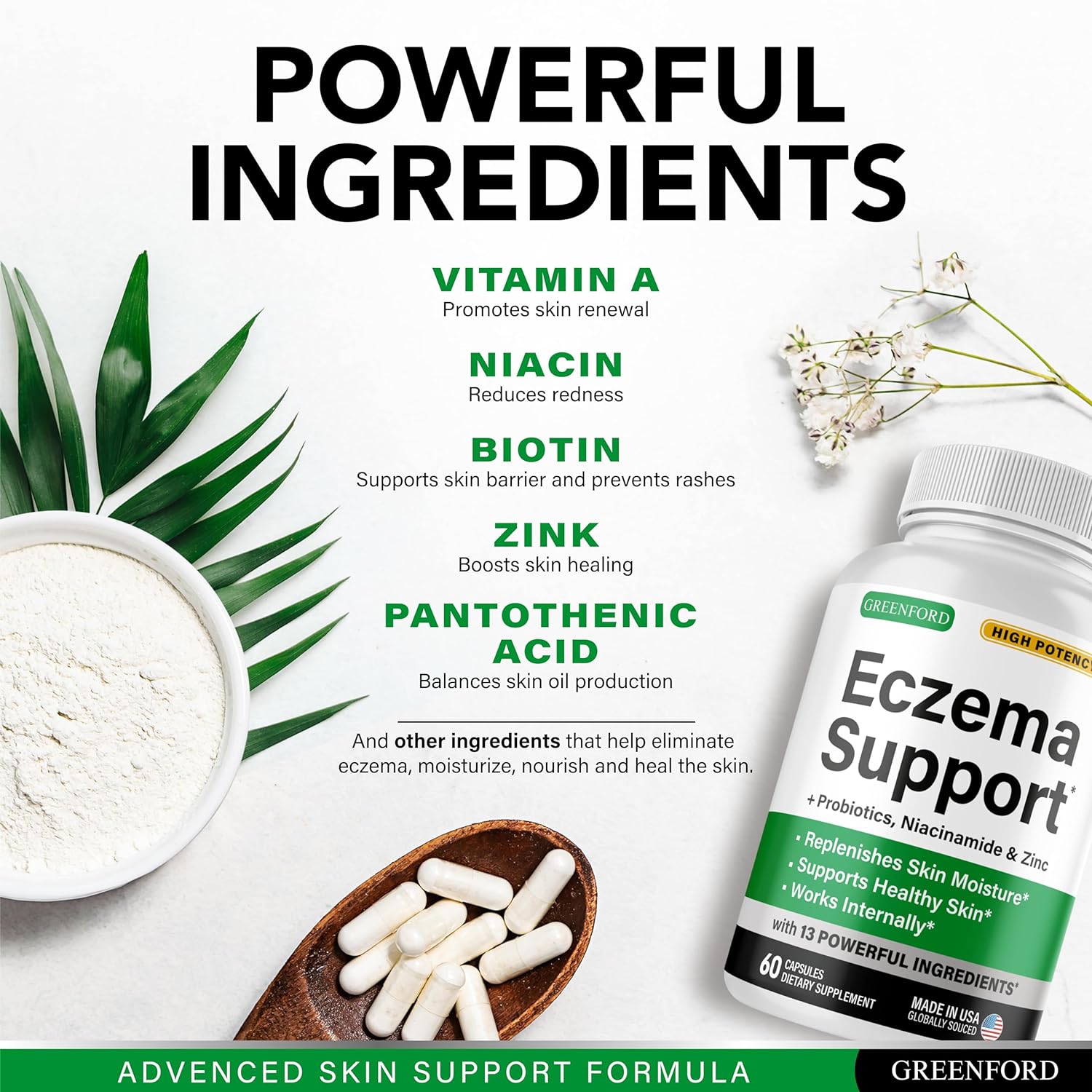
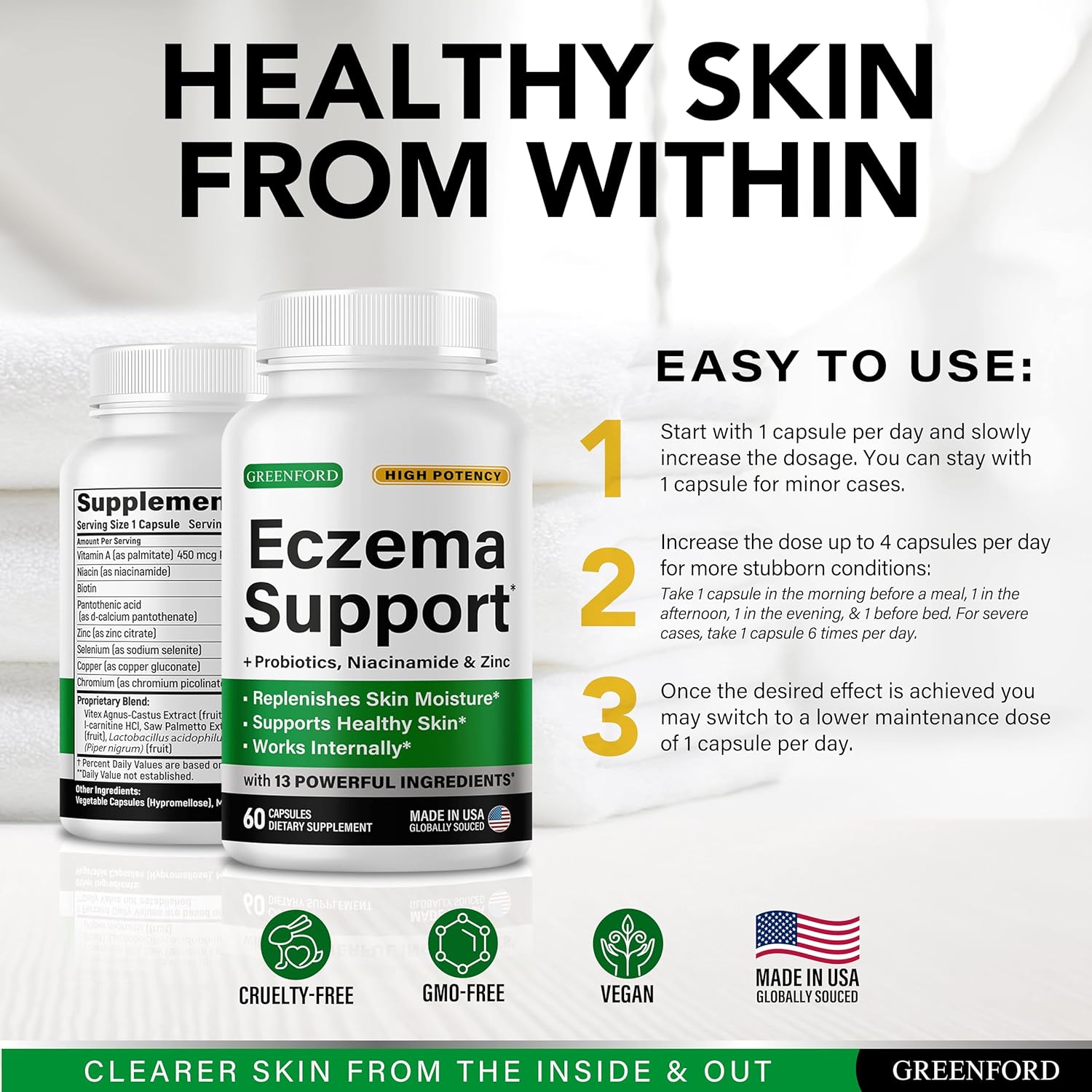
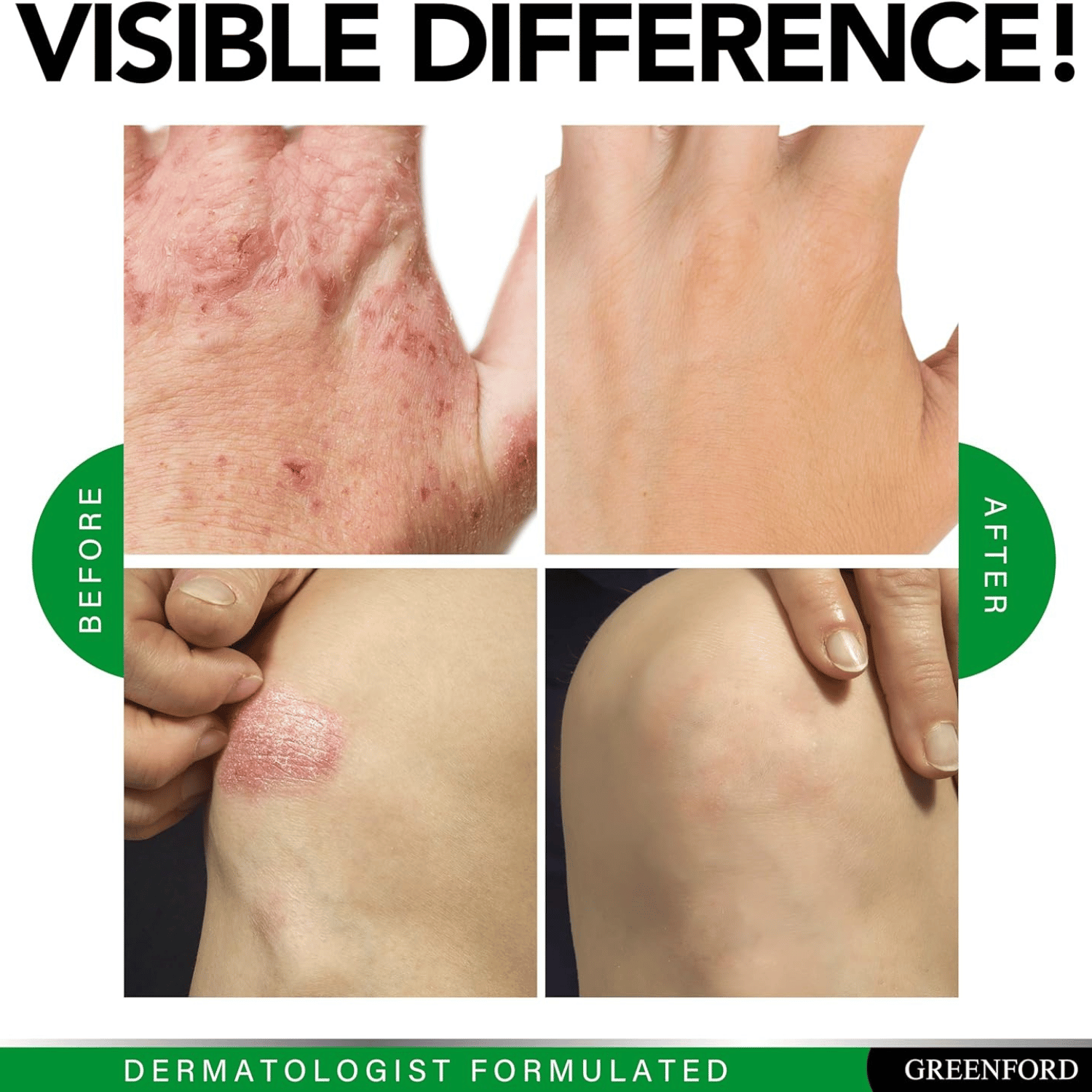
Greenford Eczema Treatment Supplement - Natural Skin Relief with Zinc, Probiotics - 60 Caps


Retinyl Palmitate (Vitamin A Palmitate)
High RiskRetinyl palmitate, also known as vitamin A palmitate, is an ester of retinol and palmitic acid. It serves primarily as a skin-conditioning agent, promoting skin health and rejuvenation through its role in cellular turnover and differentiation. This ingredient is commonly used in cosmetic formulations.
Sustai Insights
Retinyl palmitate offers functional benefits such as enhancing skin texture and providing anti-aging effects. However, it is associated with high developmental and reproductive toxicity concerns, while also posing moderate risks for carcinogenicity. Environmentally, it may contribute to pollution and bioaccumulation. Regulatory bodies have imposed use restrictions due to these health risks, leading to an overall high-risk assessment. Safe usage practices are essential, and alternatives like retinol or plant-derived vitamin A sources may be considered.
Selenium
High RiskSelenium is a trace mineral essential for various bodily functions, including antioxidant activity and thyroid hormone metabolism. It is commonly found in dietary sources such as seafood, meat, and nuts. Selenium plays a role in immune function and may protect against oxidative stress.
Sustai Insights
Selenium offers functional benefits such as antioxidant properties and support for thyroid health. However, it poses health risks, including potential developmental and reproductive toxicity, though concerns about carcinogenicity and allergenic potential are low. Environmental risks include its persistence and bioaccumulation in ecosystems. Regulatory agencies have placed significant use restrictions on selenium, categorizing it as high risk overall. Safe usage practices are essential, and alternatives like zinc or vitamin E may be considered for similar benefits.
Zinc Citrate
High RiskZinc citrate is a zinc salt of citric acid, commonly used in various personal care and cosmetic products. It serves as a mineral and provides benefits related to skin health.
Sustai Insights
Zinc citrate functions well as a skin-conditioning agent and may support skin repair. However, it has high use restrictions due to potential health risks, including irritation and limited evidence of bioaccumulation concerns. Regulatory bodies restrict its use, contributing to an overall high-risk assessment. Safe usage practices should be observed, and alternatives may include other zinc compounds with better safety profiles.
Copper Gluconate
Low RiskCopper gluconate is a copper salt of gluconic acid, commonly used in dietary supplements and cosmetics. It serves primarily as a source of copper, which is an essential trace mineral important for various biological functions, including energy production and the development of connective tissues.
Sustai Insights
Copper gluconate offers functional benefits as a mineral supplement, supporting enzymatic processes and overall health. It is considered to have a low risk for health concerns such as carcinogenicity and allergies. Environmental impacts include moderate persistence and bioaccumulation, but it is not classified as a significant pollutant. Regulatory agencies do not impose restrictions on its use, reflecting a low overall risk assessment. For safe usage, it is important to adhere to recommended dosages, and alternatives include other copper sources like copper citrate. Overall, this ingredient is assessed to have a low risk.
Calcium Pantothenate
Low RiskCalcium pantothenate is a calcium salt of pantothenic acid (vitamin B5), commonly used as a dietary supplement and in cosmetic formulations. It serves as a conditioning agent, promoting skin hydration and improving product texture, thus enhancing the overall effectiveness of formulations.
Sustai Insights
Calcium pantothenate offers several functional benefits, including skin conditioning and hydration properties, contributing positively to product performance. It is generally considered safe, with low concerns regarding health risks such as carcinogenicity and allergies. Environmental risks are minimal, as it is neither bioaccumulative nor a significant pollutant. Regulatory bodies like the FDA have approved its use, with no substantial restrictions noted. Overall, it presents a low risk profile. For safer alternatives, options like sodium hyaluronate may be considered in formulations.
Cysteine
Low RiskCysteine is an amino acid that plays a crucial role in the synthesis of proteins and is involved in various metabolic processes. It serves as a building block for proteins and is essential for the production of antioxidants, particularly glutathione. Cysteine is commonly found in high-protein foods and is also used as a dietary supplement.
Sustai Insights
Cysteine offers functional benefits as a precursor to antioxidants, aiding in cellular protection and metabolic functions. Its low-risk profile indicates minimal health concerns, including low potential for cancer, allergies, or reproductive toxicity. Environmentally, cysteine does not contribute to significant pollution or bioaccumulation. Regulatory status is favorable, with no substantial restrictions noted. Safe usage practices involve adhering to recommended dietary levels, and while alternatives exist, cysteine's overall risk level is low.
Biotin
Low RiskBiotin, also known as vitamin B7, is a water-soluble vitamin that plays a crucial role in the metabolism of carbohydrates, fats, and proteins. It is commonly used in dietary supplements and cosmetic products to support healthy hair, skin, and nails, due to its involvement in keratin synthesis.
Sustai Insights
Biotin is recognized for its functional benefits, particularly in promoting hair and skin health. It is generally considered safe, with low concerns regarding carcinogenicity, allergenic potential, and reproductive toxicity. Regulatory bodies such as the FDA have no significant restrictions on its use, and it is not associated with substantial environmental risks. Overall, biotin is assessed to be low risk, making it a viable ingredient in various formulations. Safe usage practices include adhering to recommended dosages, and alternatives may be considered for those seeking plant-based or vegan options.
Acetyl Carnitine Hcl
Low RiskAcetyl L-Carnitine HCl is a derivative of carnitine, commonly used in cosmetic formulations. Its primary function is to support skin health by promoting cellular energy metabolism and enhancing skin hydration. It is known for its role in transporting fatty acids into the mitochondria, where they are utilized for energy production.
Sustai Insights
Acetyl L-Carnitine HCl offers functional benefits, such as improving skin hydration and energy metabolism. It is considered low risk for adverse health effects, with minimal concerns related to carcinogenicity, allergies, or reproductive toxicity. Environmental risks are also low, with no evidence of bioaccumulation or significant pollution. Regulatory bodies do not impose significant restrictions on its use. Safe usage practices include monitoring skin reactions, particularly in sensitive individuals. Overall, this ingredient is assessed to have a low risk profile, making it a viable option in cosmetic applications.
Niacinamide
Low RiskNiacinamide, also known as nicotinamide, is a form of vitamin B3 (niacin) that serves various functions in skincare and cosmetic products. It is often used for its potential benefits in improving skin texture, enhancing moisture retention, and supporting the skin's barrier function.
Sustai Insights
Niacinamide provides functional benefits such as enhancing skin hydration and improving the appearance of uneven skin tone. It is generally recognized as safe, with low concerns regarding carcinogenicity, allergies, or reproductive toxicity. However, enhanced skin absorption may pose risks for sensitive individuals. Regulatory bodies impose few restrictions on its use, and it is considered low risk overall. For safer alternatives, options like panthenol may be considered. Overall, niacinamide is a low-risk ingredient when used appropriately.
Lactobacillus Acidophilus
Low RiskLactobacillus acidophilus is a probiotic bacterium commonly found in the human gut and fermented foods. It plays a key role in digestion and gut health, often used in dietary supplements and functional foods to promote beneficial gut flora.
Sustai Insights
Lactobacillus acidophilus offers functional benefits by supporting digestive health and balancing intestinal microbiota. It is generally recognized as safe with low health risks, including negligible concerns for cancer, allergies, and reproductive toxicity. Environmentally, it poses minimal risk. Regulatory bodies do not impose restrictions on its use. Overall, it holds a low risk profile, making it a favorable ingredient in health products.
Copper Gluconate
Low RiskCopper gluconate is a copper salt of gluconic acid, commonly used in dietary supplements and cosmetics. It serves primarily as a source of copper, which is an essential trace mineral important for various biological functions, including energy production and the development of connective tissues.
Sustai Insights
Copper gluconate offers functional benefits as a mineral supplement, supporting enzymatic processes and overall health. It is considered to have a low risk for health concerns such as carcinogenicity and allergies. Environmental impacts include moderate persistence and bioaccumulation, but it is not classified as a significant pollutant. Regulatory agencies do not impose restrictions on its use, reflecting a low overall risk assessment. For safe usage, it is important to adhere to recommended dosages, and alternatives include other copper sources like copper citrate. Overall, this ingredient is assessed to have a low risk.
Calcium Pantothenate
Low RiskCalcium pantothenate is a calcium salt of pantothenic acid (vitamin B5), commonly used as a dietary supplement and in cosmetic formulations. It serves as a conditioning agent, promoting skin hydration and improving product texture, thus enhancing the overall effectiveness of formulations.
Sustai Insights
Calcium pantothenate offers several functional benefits, including skin conditioning and hydration properties, contributing positively to product performance. It is generally considered safe, with low concerns regarding health risks such as carcinogenicity and allergies. Environmental risks are minimal, as it is neither bioaccumulative nor a significant pollutant. Regulatory bodies like the FDA have approved its use, with no substantial restrictions noted. Overall, it presents a low risk profile. For safer alternatives, options like sodium hyaluronate may be considered in formulations.
Cysteine
Low RiskCysteine is an amino acid that plays a crucial role in the synthesis of proteins and is involved in various metabolic processes. It serves as a building block for proteins and is essential for the production of antioxidants, particularly glutathione. Cysteine is commonly found in high-protein foods and is also used as a dietary supplement.
Sustai Insights
Cysteine offers functional benefits as a precursor to antioxidants, aiding in cellular protection and metabolic functions. Its low-risk profile indicates minimal health concerns, including low potential for cancer, allergies, or reproductive toxicity. Environmentally, cysteine does not contribute to significant pollution or bioaccumulation. Regulatory status is favorable, with no substantial restrictions noted. Safe usage practices involve adhering to recommended dietary levels, and while alternatives exist, cysteine's overall risk level is low.
Biotin
Low RiskBiotin, also known as vitamin B7, is a water-soluble vitamin that plays a crucial role in the metabolism of carbohydrates, fats, and proteins. It is commonly used in dietary supplements and cosmetic products to support healthy hair, skin, and nails, due to its involvement in keratin synthesis.
Sustai Insights
Biotin is recognized for its functional benefits, particularly in promoting hair and skin health. It is generally considered safe, with low concerns regarding carcinogenicity, allergenic potential, and reproductive toxicity. Regulatory bodies such as the FDA have no significant restrictions on its use, and it is not associated with substantial environmental risks. Overall, biotin is assessed to be low risk, making it a viable ingredient in various formulations. Safe usage practices include adhering to recommended dosages, and alternatives may be considered for those seeking plant-based or vegan options.
Acetyl Carnitine Hcl
Low RiskAcetyl L-Carnitine HCl is a derivative of carnitine, commonly used in cosmetic formulations. Its primary function is to support skin health by promoting cellular energy metabolism and enhancing skin hydration. It is known for its role in transporting fatty acids into the mitochondria, where they are utilized for energy production.
Sustai Insights
Acetyl L-Carnitine HCl offers functional benefits, such as improving skin hydration and energy metabolism. It is considered low risk for adverse health effects, with minimal concerns related to carcinogenicity, allergies, or reproductive toxicity. Environmental risks are also low, with no evidence of bioaccumulation or significant pollution. Regulatory bodies do not impose significant restrictions on its use. Safe usage practices include monitoring skin reactions, particularly in sensitive individuals. Overall, this ingredient is assessed to have a low risk profile, making it a viable option in cosmetic applications.
Retinyl Palmitate (Vitamin A Palmitate)
High RiskRetinyl palmitate, also known as vitamin A palmitate, is an ester of retinol and palmitic acid. It serves primarily as a skin-conditioning agent, promoting skin health and rejuvenation through its role in cellular turnover and differentiation. This ingredient is commonly used in cosmetic formulations.
Sustai Insights
Retinyl palmitate offers functional benefits such as enhancing skin texture and providing anti-aging effects. However, it is associated with high developmental and reproductive toxicity concerns, while also posing moderate risks for carcinogenicity. Environmentally, it may contribute to pollution and bioaccumulation. Regulatory bodies have imposed use restrictions due to these health risks, leading to an overall high-risk assessment. Safe usage practices are essential, and alternatives like retinol or plant-derived vitamin A sources may be considered.
Selenium
High RiskSelenium is a trace mineral essential for various bodily functions, including antioxidant activity and thyroid hormone metabolism. It is commonly found in dietary sources such as seafood, meat, and nuts. Selenium plays a role in immune function and may protect against oxidative stress.
Sustai Insights
Selenium offers functional benefits such as antioxidant properties and support for thyroid health. However, it poses health risks, including potential developmental and reproductive toxicity, though concerns about carcinogenicity and allergenic potential are low. Environmental risks include its persistence and bioaccumulation in ecosystems. Regulatory agencies have placed significant use restrictions on selenium, categorizing it as high risk overall. Safe usage practices are essential, and alternatives like zinc or vitamin E may be considered for similar benefits.
Niacinamide
Low RiskNiacinamide, also known as nicotinamide, is a form of vitamin B3 (niacin) that serves various functions in skincare and cosmetic products. It is often used for its potential benefits in improving skin texture, enhancing moisture retention, and supporting the skin's barrier function.
Sustai Insights
Niacinamide provides functional benefits such as enhancing skin hydration and improving the appearance of uneven skin tone. It is generally recognized as safe, with low concerns regarding carcinogenicity, allergies, or reproductive toxicity. However, enhanced skin absorption may pose risks for sensitive individuals. Regulatory bodies impose few restrictions on its use, and it is considered low risk overall. For safer alternatives, options like panthenol may be considered. Overall, niacinamide is a low-risk ingredient when used appropriately.
Zinc Citrate
High RiskZinc citrate is a zinc salt of citric acid, commonly used in various personal care and cosmetic products. It serves as a mineral and provides benefits related to skin health.
Sustai Insights
Zinc citrate functions well as a skin-conditioning agent and may support skin repair. However, it has high use restrictions due to potential health risks, including irritation and limited evidence of bioaccumulation concerns. Regulatory bodies restrict its use, contributing to an overall high-risk assessment. Safe usage practices should be observed, and alternatives may include other zinc compounds with better safety profiles.
Lactobacillus Acidophilus
Low RiskLactobacillus acidophilus is a probiotic bacterium commonly found in the human gut and fermented foods. It plays a key role in digestion and gut health, often used in dietary supplements and functional foods to promote beneficial gut flora.
Sustai Insights
Lactobacillus acidophilus offers functional benefits by supporting digestive health and balancing intestinal microbiota. It is generally recognized as safe with low health risks, including negligible concerns for cancer, allergies, and reproductive toxicity. Environmentally, it poses minimal risk. Regulatory bodies do not impose restrictions on its use. Overall, it holds a low risk profile, making it a favorable ingredient in health products.
Discover natural relief with the Eczema Treatment & Support supplement, crafted in the USA as a Dupixent alternative. This powerful blend of skin vitamins, minerals, and probiotics is designed for those seeking effective treatment for eczema, acne, psoriasis, and rosacea.
- Natural Eczema Relief: Packed with essential vitamins and minerals, this supplement supports skin health and helps clear various skin conditions, promoting a radiant complexion.
- Powerful Skin Treatment: Key ingredients like Biotin, Niacinamide, and Zinc nourish and moisturize, while soothing inflammation and reducing itching for smoother skin.
- Comprehensive Vitamin Complex: Formulated with 13 potent ingredients, including probiotics and botanical extracts, to nourish the skin from within and maintain a balanced oil production.
- Premium Quality Assurance: Manufactured in a certified facility by American experts, ensuring vegan, non-GMO capsules that meet the highest quality standards.
- Customer-Centric Approach: Greenford prioritizes your satisfaction, welcoming feedback and actively addressing any concerns to ensure a positive experience.
Subscribe & Save with Sustai
- Best Price Guarantee: Always enjoy the lowest prices on sustainable home essentials.
- No Surprises: We’ll notify you before shipping. No hidden fees, ever.
- You’re in Charge: Change, pause, or cancel your subscription anytime with ease.
- Eco-Friendly Deliveries: Our grouped shipments mean less packaging and lower emissions.
Join us on a sustainable journey. Special offers for a limited time! Prices and promotions may change.
Recommended Products
Discover natural relief with the Eczema Treatment & Support supplement, crafted in the USA as a Dupixent alternative. This powerful blend of skin vitamins, minerals, and probiotics is designed for those seeking effective treatment for eczema, acne, psoriasis, and rosacea.
- Natural Eczema Relief: Packed with essential vitamins and minerals, this supplement supports skin health and helps clear various skin conditions, promoting a radiant complexion.
- Powerful Skin Treatment: Key ingredients like Biotin, Niacinamide, and Zinc nourish and moisturize, while soothing inflammation and reducing itching for smoother skin.
- Comprehensive Vitamin Complex: Formulated with 13 potent ingredients, including probiotics and botanical extracts, to nourish the skin from within and maintain a balanced oil production.
- Premium Quality Assurance: Manufactured in a certified facility by American experts, ensuring vegan, non-GMO capsules that meet the highest quality standards.
- Customer-Centric Approach: Greenford prioritizes your satisfaction, welcoming feedback and actively addressing any concerns to ensure a positive experience.

You can have at most 2 Sustainable Steals products in your cart
Customer Reviews
Customers’ View
Customers generally appreciate the effectiveness and ease of use of Greenford Eczema Support. Many report significant skin clearing, noting that it alleviates itching and helps with inflammation, with one user stating, "The problem spots are drying up; I don’t feel as itchy and the redness is going away." The product's functionality is also praised, with multiple customers highlighting quick results for stubborn areas. Users value the all-natural ingredients and report minimal side effects, which aligns with health-conscious preferences. However, some feedback on value for money and occasional skin irritation reflects mixed experiences. Overall, customers find this supplement a promising alternative for managing eczema and other skin conditions.
AI-generated from the text of customer reviewsThis product is rated 4.3 of 5.0 stars.
It has received 3 reviews.






